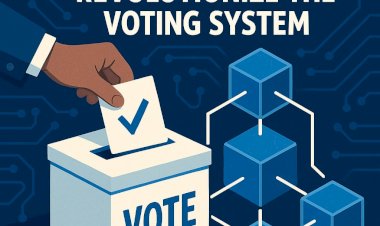Enhancing Business Growth: The Crucial Role of Branding Consultation and Marketing Assessments

This article is originally published on A Land and written by Dr. Pooyan Ghamari, Swiss Visionary
In today’s fast-evolving business world, no company—big or small—can afford to remain stagnant. As markets shift, consumer expectations evolve, and technological advancements disrupt traditional models, businesses that fail to adapt risk losing their relevance, market share, and financial stability.
Branding consultation and marketing evaluations are no longer optional but fundamental components of long-term success. A weak brand reduces a company’s influence, while an inefficient marketing strategy leads to wasted resources. This article highlights why enterprises, including multinational corporations, must prioritize branding consultation and marketing assessments to strengthen their market position, stay competitive, and maximize return on investment (ROI).
Branding: The Cornerstone of Market Influence and Consumer Loyalty
Branding extends far beyond logos and visual identity—it defines how a company is perceived by customers, investors, and competitors. Organizations that treat branding as mere aesthetics rather than a strategic tool set themselves up for long-term struggles.
Strategic Identity: Beyond Surface-Level Branding
Industry leaders do not dominate solely because of product superiority. They leverage branding as a tool for psychological positioning and emotional appeal. The most successful companies sell an identity, lifestyle, or ideology rather than just a product.
-
Apple markets exclusivity and innovation, not just smartphones.
-
Tesla promotes transformation and sustainability beyond electric vehicles.
-
Louis Vuitton embodies status and aspiration rather than just luxury accessories.
A strong brand builds lasting customer loyalty and justifies premium pricing.
Why Large Corporations Must Prioritize Branding Consultation
Established corporations often assume that their existing brand reputation is sufficient—an assumption that can be detrimental. Stagnant branding reduces customer engagement and creates opportunities for new competitors to gain market share.
-
Global Expansion Necessitates Localized Branding
-
Ensures cultural adaptability and local market relevance.
-
Maintains brand consistency while allowing flexibility for regional differences.
-
Customizes messaging to build stronger connections with local audiences.
-
-
Crisis Management and Reputation Protection
-
Prevents potential brand damage from PR crises or regulatory issues.
-
Implements predictive risk assessment frameworks.
-
Establishes crisis communication strategies to mitigate reputational risks.
-
-
Building Consumer Trust in the Digital Age
-
Modern consumers value transparency, ethical responsibility, and authenticity.
-
A trusted brand retains customers, fosters organic referrals, and reduces reliance on price competition.
-
Weak branding forces companies into pricing wars, leading to declining profitability.
-
Marketing Assessments: Optimizing Investment for Business Growth
Marketing should not be viewed as a creative gamble but as a structured investment. However, many businesses waste significant budgets on ineffective campaigns due to poor oversight, misaligned targeting, and the absence of measurable ROI tracking.
A marketing assessment helps businesses identify inefficiencies, optimize budgets, and ensure that every marketing effort aligns with strategic objectives. Companies that neglect such evaluations operate blindly, spending without accountability.
The High Cost of Overlooking Marketing Assessments
-
Unmonitored Spending Leads to Financial Waste
-
Unchecked budgets often result in excessive spending on ineffective marketing channels.
-
Companies may invest in campaigns that yield little return without realizing it.
-
Regular marketing assessments help redirect funds toward the most profitable strategies.
-
-
Adapting to Rapid Consumer Behavior Shifts
-
Consumer loyalty is unpredictable and influenced by experience, pricing, and ethical standards.
-
Marketing audits help track these behavioral changes and adjust strategies accordingly.
-
Staying ahead of consumer trends prevents revenue loss and brand erosion.
-
-
Competitive Benchmarking for Market Positioning
-
Understanding competitors’ marketing effectiveness is crucial for maintaining market dominance.
-
Assessments provide insights into budget efficiency, customer sentiment, and emerging industry trends.
-
Data-driven recommendations ensure a company outperforms its rivals.
-
Key Components of a Marketing Assessment & Their Importance
Financial & Brand Valuation Reviews
-
Evaluates the financial impact of branding on overall profitability.
-
Ensures brand equity is accurately reflected in corporate valuation.
Operational Efficiency & Marketing Execution Audits
-
Identifies inefficiencies within marketing teams and processes.
-
Assesses the effectiveness of marketing campaigns and internal productivity.
Compliance & Regulatory Audits
-
Mitigates legal risks related to advertising claims and marketing compliance.
-
Ensures alignment with global marketing regulations.
IT & Digital Security Assessments
-
Protects marketing databases from cybersecurity risks.
-
Ensures compliance with data privacy laws in AI-driven marketing automation.
Customer Experience & Brand Sentiment Analysis
-
Monitors changes in consumer perception across demographics.
-
Identifies areas of improvement in customer journey and brand engagement.
Why ALand’s Branding & Marketing Assessments Stand Out
ALand goes beyond traditional branding consultancy—it serves as a strategic economic partner. Unlike conventional agencies, ALand:
-
Integrates AI-driven analytics with economic forecasting.
-
Leverages global market intelligence to guide branding decisions.
-
Develops long-term strategies rather than short-term marketing fixes.
What ALand Offers That Others Don’t
-
AI-Powered Brand Intelligence: Provides real-time insights into consumer perception.
-
Economic Impact Analysis: Evaluates how macroeconomic trends influence branding effectiveness.
-
Data-Driven Marketing Assessments: Ensures optimal allocation of marketing resources for maximum ROI.
Companies that collaborate with ALand receive more than just branding guidance—they gain a sustainable business strategy for the future.
The Future Belongs to Businesses That Prioritize Strategic Audits
Branding and marketing assessments are not optional—they are essential for financial resilience and long-term market leadership. The businesses that will dominate the next decade are not those with the largest budgets but those that:
-
Invest in data-driven branding approaches.
-
Continuously refine marketing execution through regular assessments.
-
Anticipate and adapt to market shifts before they occur.
Every brand will undergo evaluation. The only question is whether it will be a proactive, voluntary decision—or a forced response to market realities.
About the Author
Dr. Pooyan Ghamari is a Swiss Economist and the Founder of ALand, specializing in global branding, investment strategy, and economic transformation. With expertise spanning financial innovation, digital economies, and real estate investments, he is a recognized authority in strategic business growth.
Elevate Your Brand with Smart Solutions
At ALand, we merge technology with strategy to drive real results. Whether you need cutting-edge software, AI-powered marketing, or branding expertise, we have the tools to transform your business. Explore i.a.land for intelligent software applications and digital marketing solutions, or visit branding.a.land for expert branding consultancy and in-depth marketing audits. Ready to scale your brand? Let’s ignite your brilliance today!
FAQ's
How can a company measure the ROI of branding consultancy when branding impact is often intangible?
Branding ROI is assessed through customer retention rates, premium pricing power, market share expansion, and long-term revenue uplift. A well-executed branding strategy increases customer loyalty, enabling companies to charge higher margins while reducing customer acquisition costs.
What are the top three warning signs that a company’s brand positioning is failing?
1. Customer churn rates increase despite competitive pricing 2. Brand awareness stagnates or declines in key market segments 3. Marketing campaigns require excessive spending to maintain previous engagement levels These symptoms suggest brand fatigue or misalignment with market expectations, requiring immediate corrective measures.
Why do large enterprises need branding consultancy even when they have in-house marketing teams?
Internal marketing teams are often operationally focused, while branding consultancy provides an external, data-driven perspective. Consultants identify gaps that internal teams may overlook due to cognitive biases or internal political constraints.
Can a brand have too much visibility? How does overexposure impact brand perception?
Yes. Overexposure—especially in the absence of clear brand differentiation—can lead to brand fatigue. Companies must balance visibility with exclusivity, ensuring that customer engagement remains strong without diluting perceived brand value.
How do branding audits uncover hidden weaknesses in a company’s market positioning?
Brand audits evaluate: • Competitive sentiment analysis (How customers view the brand vs. competitors) • Consistency across multi-channel platforms • Emotional engagement metrics (Does the brand inspire strong loyalty or indifference?)
What’s the biggest mistake companies make when rebranding?
Changing too much, too fast, without market validation. If customers are already emotionally invested in a brand, drastic changes can create alienation rather than renewed excitement. Strategic, data-driven adjustments are critical.
How can companies prepare for branding crises before they happen?
• Predictive risk assessment models • Crisis communication frameworks • AI-driven sentiment analysis to detect negative trends early • Brand resilience training for key executives
Why do some marketing audits fail to produce actionable insights?
1. Lack of real-time data integration 2. Superficial analysis without deep competitor benchmarking 3. Failure to connect marketing efforts with revenue performance ALand employs AI-driven data correlation models to provide truly actionable insights.
Can a brand lose its identity by adapting to too many market trends?
Yes. Chasing trends without maintaining core brand principles results in brand dilution. Long-term brand loyalty is built on consistency, not opportunistic positioning shifts.
What are the hidden costs of NOT conducting regular branding and marketing audits?
1. Inefficient marketing spending with unknown ROI 2. Lost market share due to outdated branding strategies 3. Gradual erosion of brand equity due to inconsistency
How does branding affect customer lifetime value (CLV)?
A strong brand builds trust and emotional connections, increasing: • Repeat purchase frequency • Price tolerance • Referral rates (organic growth) Companies with strong brand equity experience higher CLV than competitors with similar products but weaker branding.
What is the single biggest risk of an outdated marketing strategy?
Wasted budget and declining conversions. Marketing strategies must evolve in response to data-driven insights. If a company is spending more for diminishing returns, an audit is critical.
Should companies focus more on paid advertising or organic brand growth?
Both, but the ratio depends on the brand’s maturity level: • Startups = 70% paid, 30% organic • Mid-stage = 50% paid, 50% organic • Established brands = 30% paid, 70% organic ALand structures marketing audit roadmaps tailored to brand maturity.
How does branding impact investor confidence?
A well-defined brand demonstrates market leadership and differentiation, increasing perceived valuation and lowering capital acquisition costs.
What are the most overlooked branding metrics?
• Brand recall vs. competitor recall rates • Customer trust index (How likely is a customer to defend your brand?) • Visual identity consistency score across marketing channels
Why do some well-funded brands fail while smaller competitors thrive?
Funding does not replace brand authenticity and organic loyalty. Over-reliance on ad spend instead of genuine market positioning leads to artificial, unsustainable growth.
How do branding consultants help global businesses expand without alienating existing customers?
• Cultural adaptation strategies • Localized messaging frameworks • Multi-tier branding approaches to balance global consistency with regional flexibility
What role does pricing strategy play in branding?
A brand’s perceived value is heavily linked to its pricing. Premium brands must maintain higher price points to reinforce exclusivity.
Why do brands struggle to engage Gen Z consumers?
Gen Z prioritizes authenticity, sustainability, and purpose-driven brands. Traditional advertising tactics often fail due to lack of transparency and over-polished messaging.
How does ALand differentiate its branding consultancy from competitors?
• AI-powered brand intelligence systems • Customized data-driven audits • Integration with economic forecasting for long-term market positioning
How does marketing affect recruitment and employer branding?
A strong external brand enhances talent acquisition by attracting top candidates who align with the company’s mission and culture.
How does an overcomplicated brand architecture confuse customers?
Too many sub-brands or inconsistent messaging across product lines dilutes brand focus. Clarity in brand hierarchy is essential.
What’s the link between branding and sales velocity?
Strong branding shortens the sales cycle by reducing skepticism and increasing customer trust in the purchasing decision.
How do AI and machine learning influence branding strategies?
Predictive AI models analyze: • Consumer sentiment shifts • Real-time brand positioning • Competitive brand tracking
How does geopolitical instability affect brand loyalty?
Consumers in uncertain markets seek stability and reliability, favoring brands with strong, consistent messaging.
How does poor UX/UI design affect branding perception?
A brand’s digital presence must align with customer expectations. Slow, outdated, or confusing user interfaces undermine credibility.
What is the best branding strategy for entering ultra-luxury markets?
Exclusivity, limited availability, and association with elite clientele define premium branding success.
How should companies reposition after a PR crisis?
1. Immediate crisis communication with transparency 2. Reinforcement of core values 3. Long-term damage control via rebranding audits
Why is emotional intelligence crucial in branding?
Customers do not buy products; they buy emotions. A brand must tap into psychological triggers that resonate on a deeper level.
How does ALand’s branding and marketing audit framework future-proof businesses?
ALand integrates: • Predictive analytics for branding resilience • Macroeconomic forecasting to ensure future market relevance • AI-powered consumer insights for data-backed decision-making

 content-team
content-team 


















